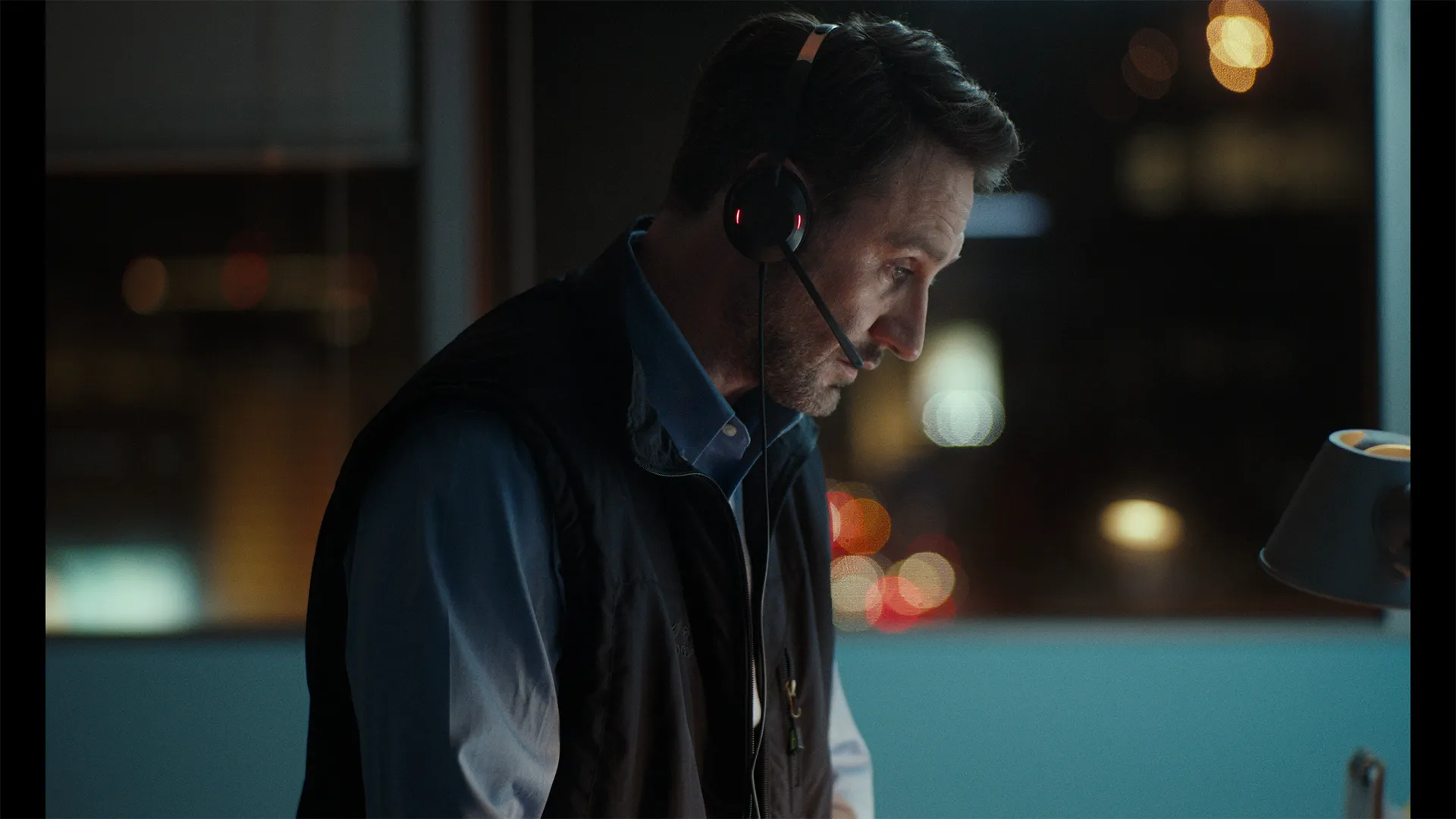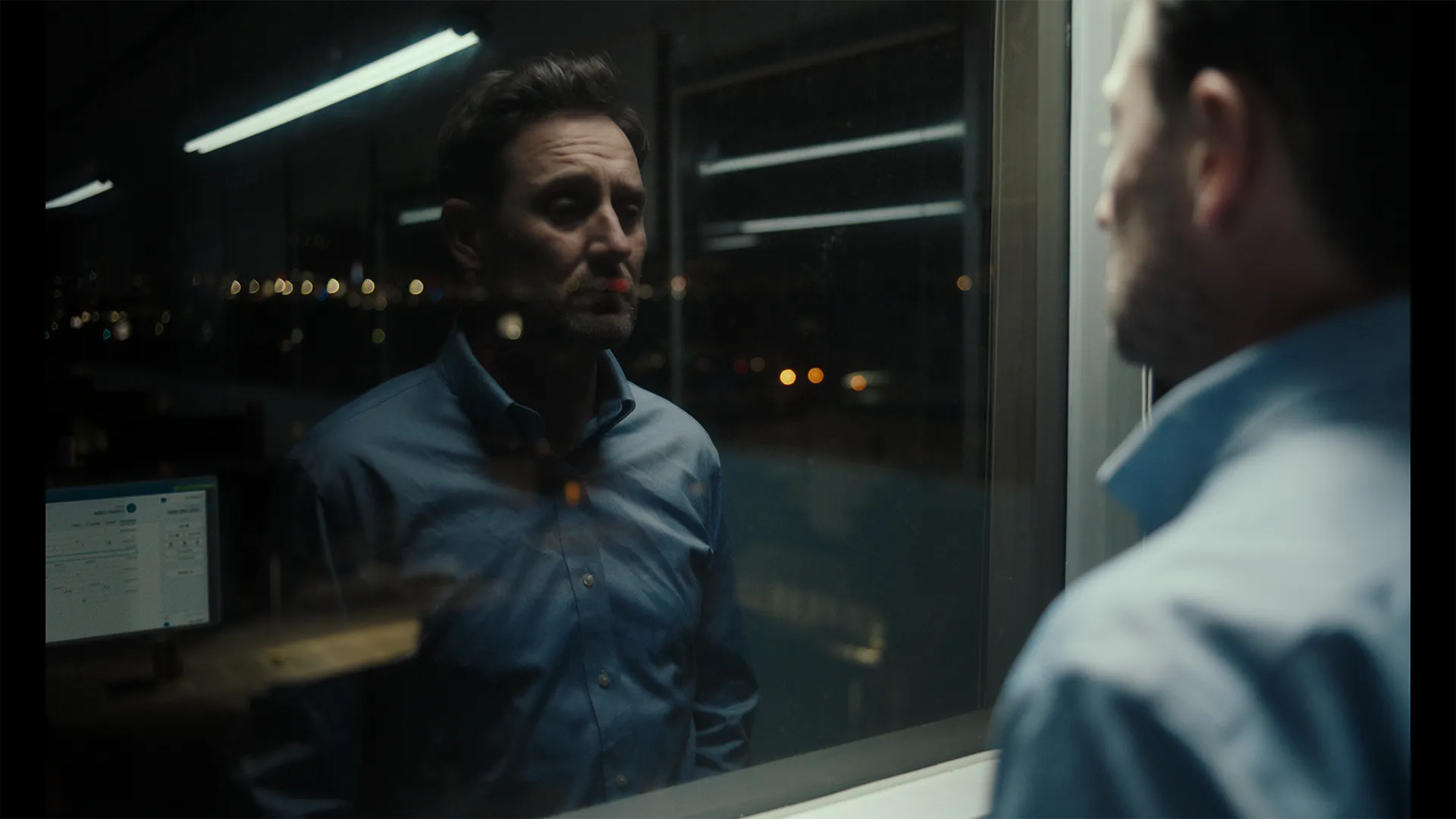Lifeline plunges us into a claustrophobic call center where every ring tightens the screws on Steven Thomas’s psyche. The film’s structure mirrors a finely tuned mechanism: terse exchanges with distressed callers punctuate the steady march toward midnight. Director Feras Alfuqaha stages much of the action in one dimly lit room, yet edits and reframes each shot so that memory sequences feel sudden and urgent. When the aspect ratio snaps from widescreen to 4:3 during flashbacks, it signals a shift in emotional territory—nostalgia warping into dread.
The screenplay threads real‐time dialogue with carefully timed tremors (no one else seems to notice) that echo Steven’s buried trauma. Each seismic jolt is scored to jolt us: Omar Habbak’s electronic pulses swell with tension, then cut out when the phone clicks. That silence becomes its own tool, letting us inhabit Steven’s loneliness.
This interplay between pacing and performance recalls The Guilty’s single‐room intensity, while the time‐slip premise nods to cult favorites such as Frequency—yet Lifeline stakes a claim through its raw focus on empathy under pressure. Josh Stewart’s micro-expressions ride the editing rhythm, making us share every doubt as he deciphers clues on a cracked screen. Here, cinematic form and emotional content dovetail so neatly that we’re drawn into Steven’s race against time—and left wondering what we’d whisper to our own past selves.
Pressure Lines: How Structure Amplifies the Countdown
Lifeline’s narrative functions like a finely tuned gear system, each element driving the next toward a moment of reckoning. At its heart lies a late-night suicide-hotline setting that feels more like a pressure chamber than a workspace. Every ring, every pause, intensifies the sense that time is slipping away.
Splitting the story between present-day Steven and his younger self on the line establishes a looping tension: we’re watching an expert in crisis management become a panicked investigator of his own past. The constant reminder that midnight is the deadline—for both rescue and self-rescue—turns New Year’s Eve into a character in its own right.
The screenplay hooks us with familiar hotline scenarios—an abused spouse, prank hang-ups, frantic pleas for help—then layers in sci-fi elements so subtly you barely notice until the tremors and cryptic clues demand attention. Earthquakes rattling Steven’s desk become more than set dressing; they mirror the fractures in his psyche. Anagrams scrawled on post-its aren’t just puzzles, they’re breadcrumbs leading to a deeper conspiracy.
Flashbacks to childhood arrive in controlled bursts, never overstaying their welcome, and always bringing fresh stakes. The first revealing callback—when Steven realizes the young caller shares his exact name and history—marks the pivot from procedural sympathy to personal obsession. Subsequent discoveries, like the motel research and the author’s late-night call, ratchet the mystery even higher.
Tension emerges through perfectly timed interruptions. A phone dropping to silent, a tremor during a confession, the camera lingering on Stewart’s tight jaw—all signals that something crucial lies just out of frame. Details stay hidden until the film’s late act, when a single, extended shot pastes together clues in one twisting sequence. That reveal recontextualizes every prior exchange—turning routine dialogue into loaded confessions.
Yet even as the final pieces lock into place, questions linger about fate versus choice, and whether the film’s logic truly spans its own bridges. Could those fractures in structure hint at a deeper rupture still waiting to be explored?
Embodied Echoes: Performance Under Pressure
Josh Stewart anchors Lifeline with a portrait of controlled tension that shifts imperceptibly into desperation. In early scenes, he projects the steady calm of a seasoned crisis counselor—soft-spoken, measured pauses offering reassurance. Yet as tremors ripple through his office and the young caller’s deadline approaches, Stewart’s posture tightens, eyes darting to off-screen clues.
His transitional arc feels organic: a man trained to soothe others begins to unravel under the weight of his own hidden fractures. This performance recalls the intimate urgency of The Guilty, where every micro-expression carries narrative weight, yet Stewart injects a lived-in weariness that goes deeper.
Opposite him, Judah Lewis delivers a vocal performance that underlines the story’s dual timeline. Without a single on-camera moment, he captures youthful confusion and mounting panic through shifts in cadence and breathlessness. When his voice cracks on the line, it reverberates like the unseen earthquakes—small tremors that rattle Steven’s resolve. The mimicry of Stewart’s tone at the start gives way to raw urgency, reminding us how voice alone can carry emotional stakes.
Supporting players enrich the world beyond the desk. Charlene Amoia appears in fleeting video calls as Steven’s wife, balancing warmth with the frustration of watching him drift further into obsession. In those brief moments, she grounds his stress in a family dynamic that never feels incidental.
August Maturo’s teen son, buoyant and hopeful, offers a foil to his father’s turmoil; his optimism underscores how much Steven risks losing. P. L. Brown as the security guard and Aisha Lomax’s off-screen law-enforcement officer provide practical lifelines, their authoritative tones pulling Steven back toward procedure.
The chemistry between the two Stevens—woven entirely through audio cues—drives the film’s emotional core. Off-stage voices and quick appearances deepen Steven’s backstory without derailing momentum. Each minor role adds texture: a distracted operator, a concerned officer, a boy on the edge of despair. Together, they build a mosaic of crisis and compassion so detailed that we can’t help wondering how many unheard stories lie just beyond the receiver’s range.
Framing the Unseen Quakes: Direction & Cinematography
Feras Alfuqaha treats the call-center as a single “level,” drawing tension from every inch of its confines. Strategic framing turns ordinary office corners into visual traps: negative space around Steven widens as the night deepens, suggesting both isolation and the widening cracks in his certainty. Much like in indie games such as Inside, the environment itself becomes a silent narrator.
Cool blues and greys dominate the main timeline, giving each desk lamp or monitor glow a forensic chill. Flashbacks snap into a 4:3 aspect ratio drenched in warm retro hues—an emotional filter that recalls cult sci-fi thrillers shot on video, where memory feels both intimate and unreliable. That shift in palette signals our transition between present panic and past comfort, keeping viewers tethered to Steven’s state of mind.
Alfuqaha deploys tight close-ups almost like a game’s first-person perspective, zeroing in on Stewart’s micro-expressions as if they were choice prompts. Subtle camera tilts and sways—triggered by each tremor—mimic joystick vibrations, translating unseen seismic shifts into visual feedback. When the phone rings, the edit cuts so sharply that sound and image collide, jolting us into the next beat.
Flashbacks arrive with a surgeon’s precision: each inserted at a rhythm that maintains forward drive without stalling the main narrative. The final act’s near–one-take sequence plays like a VR sequence frozen in real time—immersive, almost claustrophobic, refusing relief. In a film that asks how we piece together scattered signals, these visual strategies keep us questioning which tremor will shake Steven—and us—awake next.
Aural Undercurrents: How Sound Shapes the Tension
Omar Habbak’s score drives the countdown with measured pulses that sync to the film’s heartbeat. Each rhythmic thrum swells as midnight nears, then cuts away just as dialogue intensifies, leaving a vacuum that underscores Steven’s isolation.
Subtle ambient effects layer in unseen tremors—barely audible rumbles under every phone call, as if his buried memories are clawing their way back. Static crackles on the line and click tones snap us alert, turning routine exchanges into moments of dread.
Voice mixing maintains clarity between Stewart’s composed cadence and Lewis’s urgent tremor, so their conversations never blur. A gentle undercurrent of ringing phones and distant murmurs roots us in the call center, reminding us every plea for help hangs on the other end of the receiver. Those silences become as revealing as the music: what isn’t played resonates long after the credits roll.
Shaken Foundations: Trauma, Time and the Line
At its core, Lifeline channels internal rupture into physical tremors. Those mini-earthquakes that buffet Steven’s desk become stand-ins for memories he’s spent years burying. Each subtle jolt echoes a past blow, recalling narrative-driven games like Hellblade: Senua’s Sacrifice, where environmental feedback mirrors mental struggle. Flashbacks arrive in calibrated bursts—brief glimpses of an abusive father, childhood hideaways—so that each memory cycle feels earned rather than tacked on.
New Year’s Eve isn’t just a deadline, it’s a narrative device that reframes regret as potential resurgence. The ticking clock aligns with moments in cult sci-fi like Primer, where timelines fold back on themselves, forcing characters to weigh fate against self-determination. In Lifeline, Steven’s race to save a younger echo of himself becomes a meditation on whether one moment of intervention can rewrite a lifetime.
The film treats suicide-prevention work as its own moral crucible. Steven balances textbook empathy—tailored phrases, calm intonation—with the crack in his own compassion when he realizes he’s as much in need as his callers. His dual role recalls indie gems such as Night in the Woods, where care for others exposes one’s own vulnerability. That tension—helper emerging as the helped—shifts our allegiance in real time.
Communication threads through every scene. The phone line is his lifeline, a conduit for salvation that can also amplify despair. Static hisses like a restless spirit as callers confess their darkest thoughts. In the silent stretches between rings, the empty office feels populated by unheard cries. It’s an irony worthy of François Velle’s minimalist dramas, where silence speaks volumes.
By bending time and space through tremors, tones and fractured memories, Lifeline asks how many hidden calls for help go unanswered—on the line, on the screen, and inside ourselves.
Pulse of the Countdown
Lifeline respects its 80-minute span, cutting away anything that might stall the story. Exposition and suspense share screen time in measured doses: early scenes establish Steven’s skill with routine calls, then shift gears just as we settle in. That tight runtime feels as deliberate as a well-designed indie title that refuses filler.
The film’s rhythm hinges on contrast. Low-stakes conversations—domestic disputes, prank hang-ups—lull us into procedural calm, only to snap awake when a new revelation lands. The midpoint shift arrives with a jolt: learning that the caller carries Steven’s own name and history rewrites the rules. It echoes systems in narrative games where a single mechanic flip changes everything, compelling you to rethink earlier levels.
Emotional intensity swells through a careful crescendo of flashbacks and present-moment panic. Each memory cut layers new weight onto Stewart’s tightening expressions, and by the final conversation, we share his breathless urgency. That climax recalls cult thrillers that rely on character moments over spectacle—because when a flash of insight lands just as the clock nears midnight, it lands hard.
In the aftermath, the film’s resolution bends prior scenes into fresh shapes. Details we skimmed now feel like deliberate clues. And as credits approach, we’re left wondering which second truly changed Steven’s path—and whether our own pivotal calls are waiting in silence.
Full Credits
Director: Feras Alfuqaha
Writers: Brady Morell, Brian Price
Producers: Feras Alfuqaha, Leal Naim
Cast: Josh Stewart (Steven Thomas), Judah Lewis (Young Steven), August Maturo (Jeff Thomas), Charlene Amoia (Vivian Huxley), Luke Benward (Andrew Thomas), Craig Stark (Kenneth Thomas), P.L. Brown (Jerome), Jill Awbrey (Claire Thomas), Jocelyn Ayanna (Loretta Williams), Katy Wright-Mead (Mary), Aisha Lomax (Officer Fredericks), Brecken Merrill (Steven Thomas as a child), Tu Morrow (Young Vivian Huxley), Nicole Santiago (Cindy), Casey Simpson (Teen Andrew Thomas)
Director of Photography (Cinematographer): Rasa Partin
Editors: Dulcinee DeGuere, Nasos Gatzoulis
Composer: Omar Habbak
The Review
Lifeline
Lifeline’s tight pacing, immersive lead performance and inventive weave of tension and memory deliver a gripping single-location thriller. The interplay of flashbacks, seismic clues and compassionate dialogue keeps stakes high, even if the final reveal stretches plausibility. It provides an intense emotional journey that lingers once the credits roll.
PROS
- Josh Stewart’s performance anchors every moment
- 80-minute runtime keeps tension taut
- Visual shifts and lighting reinforce emotional beats
- Score and ambient effects amplify suspense
- Flashbacks enrich Steven’s backstory without overwhelming
CONS
- Final reveal stretches narrative logic
- Some twists feel underexplored
- Flashback cuts occasionally stall momentum
- Sci-fi aspects aren’t fully mined



















































